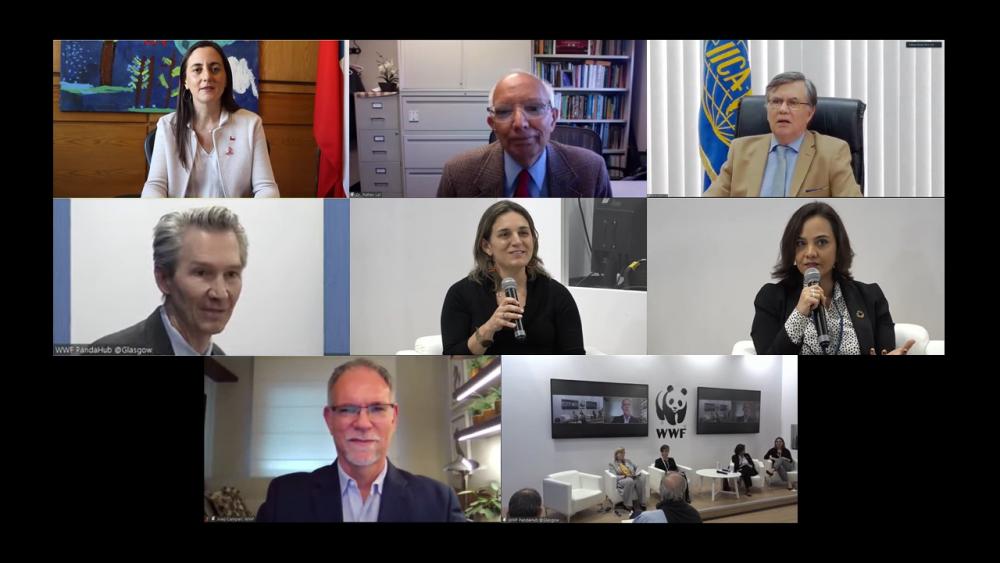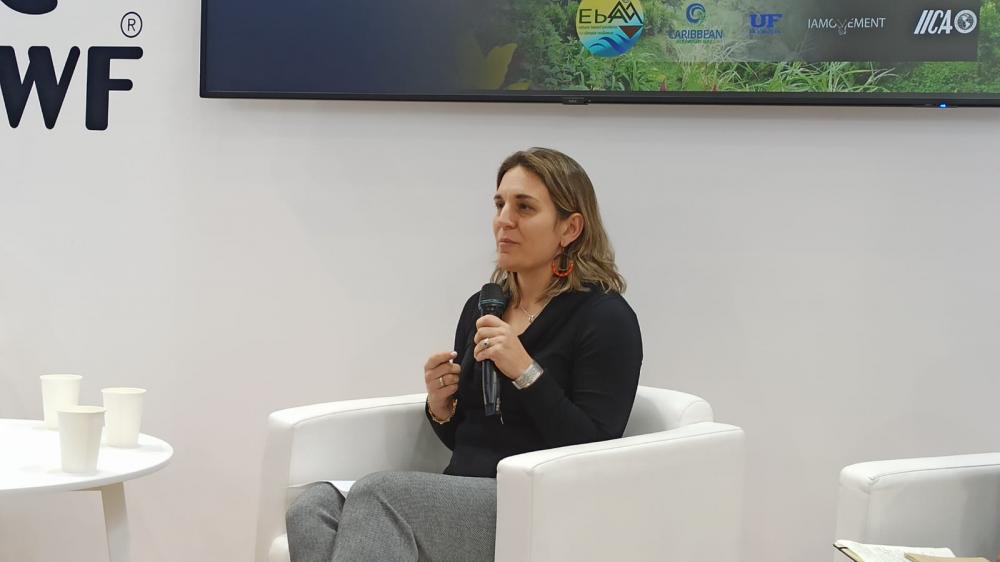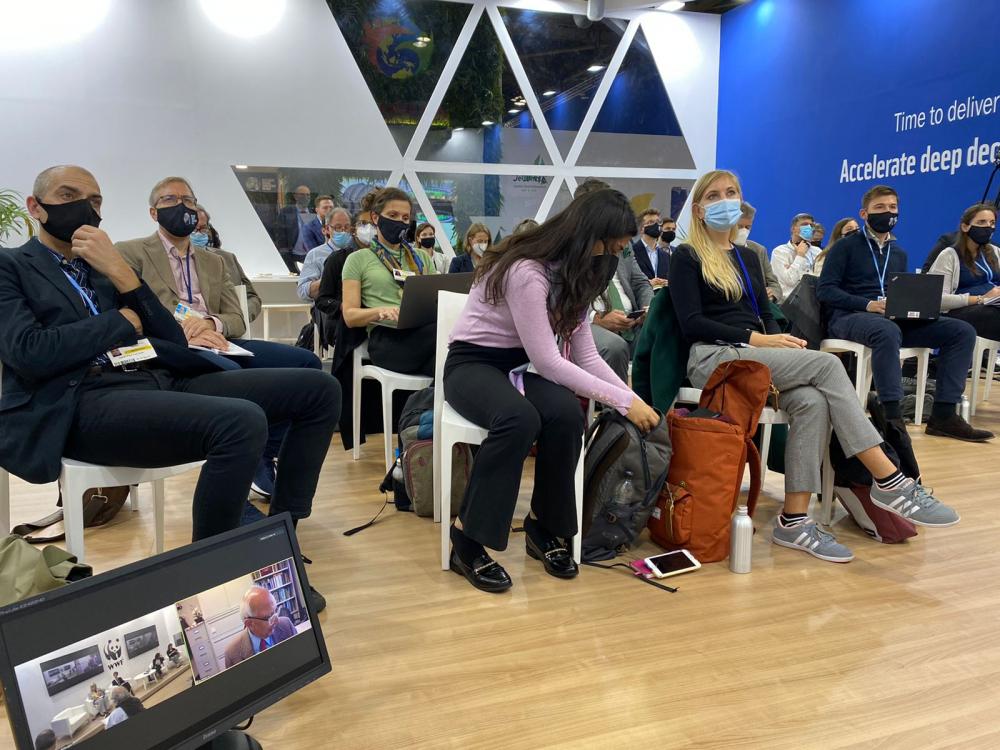Experts issue a warning at COP 26: soil care and health must be part of the global climate change agenda

Glasgow, Scotland, 4 November 2021 (IICA). The importance of soil health for climate change mitigation, resilience and agrifood system sustainability took center stage during a debate among representatives from international organizations at the global Climate Change Conference of the Parties (COP 26), taking place in Glasgow, Scotland.
Experts at the event underscored the need to include soil care in global discussions on how humanity should combat climate change, stressing that, as a matter of urgency, countries must translate scientific consensus into action.
The Coalition of Action 4 Soil Health (CA4SH)—created in September during the UN Food Systems Summit—was introduced at the debate by Kelly Witkowski, Manager of the Climate Change and Natural Resources Program of the Inter-American Institute for Cooperation on Agriculture (IICA).
The Coalition is an amalgamation of multiple private and public sector actors for the purpose of improving soil health at the global level, by addressing critical implementation, monitoring, policies and public and private investment barriers that restrict farmers’ attempts to adopt healthy soil practices.
Witkowski remarked that, “Eighty percent of carbon is stored in our soils, which presents both a problem and an opportunity. We usually place more focus on trees, but we must give greater visibility to soils, which are the source of 25% of biodiversity”.
“We must work with farmers in the field to find out about the obstacles that they face, understand their needs and facilitate their training. The coalition is seeking to translate the advances made by science and research into action”, she added.
Decorated scientist, Rattan Lal, who is considered to be the leading soil science authority, participated in the event by videoconference. Lal heads the Carbon Management and Sequestration Center (CMASC) at The Ohio State University, which is spearheading the Living Soils of the Americas program alongside IICA. The program serves as a bridge between science, the public policy arena and development work on soil health restoration in the Western Hemisphere.

Lal maintained that soil has been the source of life and prosperity for all civilizations throughout history and explained that soil health is a determining factor for at least seven of the Sustainable Development Goals (SDGs) that were adopted by UN Member States with a view to 2030.
According to Lal, without healthy soils, we will not be able to ensure zero poverty (SDG 1), zero hunger (SDG 2), good health and well-being (3), clean water and sanitation (6), affordable and clean energy (7), climate action (13), and proper management of terrestrial ecosystems (15).
Furthermore, he argued that, “Life essentially depends on soil health. Today, more than 40% of the Earth’s surface is degraded and 840 million people are suffering from food insecurity. We must restore the health of our soils through healthy, carbon-negative agricultural practices”.
Lal, who is an IICA Goodwill Ambassador, called for the establishment of a long-term agenda aimed at restoring the health of soils, with one of its key objectives being to empower small famers to adopt good agricultural practices.
“We can achieve this. The time to act is now”, he concluded.
Minister of Agriculture of Chile, María Emilia Undurraga, in a video message from Santiago, commented that soil health directly affects the well-being of societies.
“A healthy agriculture sector will only be possible if we have living soils. Chile is promoting a new paradigm to tackle climate change, by generating actions and policies that facilitate sustainable production. We are committed to this path”, said Undurraga”.
Manuel Otero, Director General of ICA, who participated in the event by videoconference from San Jose, Costa Rica, reaffirmed the Institute’s commitment to the Coalition of Action 4 Soil Health, based on the conviction that it contributes to the quality of life, not only of rural communities, but also of urban populations.
He explained that, “Through its joint program with The Ohio State University, IICA is aiming to boost soil productivity and increase ecosystem services. We are already implementing a series of science-based actions in Chile, Mexico, Grenada, Colombia and Uruguay, relying on the participation of important private sector entities, such as Bayer, PepsiCo and Syngenta”.
He confirmed that IICA abides by the One Health concept and stressed the importance of raising awareness at the global level about the close connection between human well-being and proper ecosystem functioning.

“Up until just a few years ago, our sole concern was how to improve productivity. This was our obsession, given the need to feed a growing world population. However, we have now understood that we must balance improved productivity with soil care and biodiversity”, said Juan Lucas Restrepo, Director General of the Alliance of Bioversity International and the International Center for Tropical Agriculture (CIAT).
For Restrepo, the key is to improve research and innovation and to recognize that the problem is the collective responsibility of public and private actors. “We cannot”—he said— “ask farmers to shoulder all the responsibility for soil health; they need incentives and training”.
On the other hand, Joao Campari, Global Leader of Food Practice at the international environmental organization, World Wildlife Fund (WWF), feels that we should bear in mind that soil is not only a tool to maximize production, but also a living ecosystem.
He pointed out that, “Soil is one of the largest ecosystems on the planet, surpassed only by the oceans. Ninety-five percent of our food production hinges on soil health. Soil degradation reduces not just the quantity, but the quality of food”.
The need to raise awareness about the importance of this issue was also emphasized by Mexican diplomat, Miriam Medel, a representative of the United Nations Convention to Combat Desertification (UNCCD).
In her view, “Soil conservation is important for climate change mitigation and adaptation, as well as for food security, biodiversity protection, job creation and people’s ability to generate income to support themselves”.
More information:
Institutional Communication Division.
comunicacion.institucional@iica.int